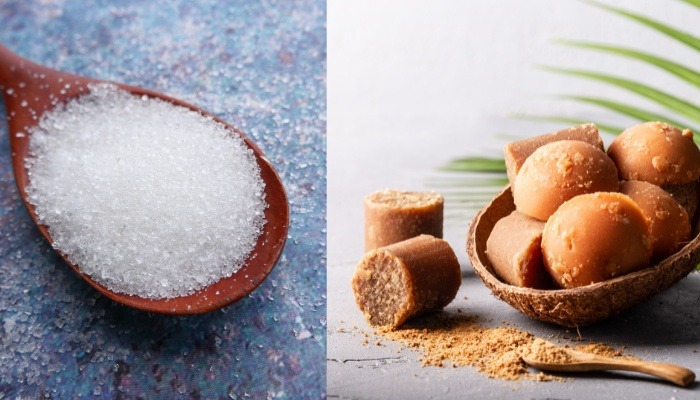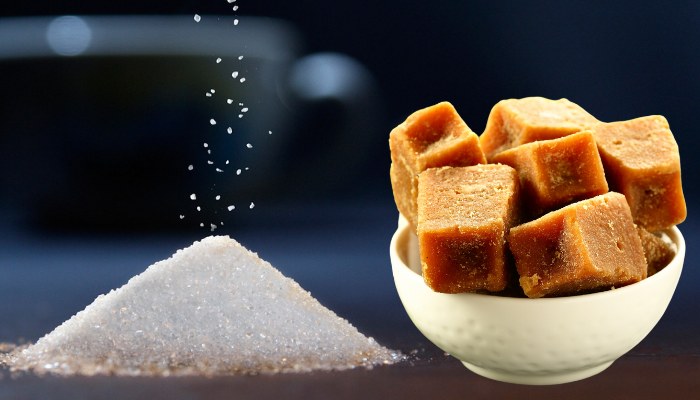

In the pursuit of healthier dietary choices, the debate between jaggery and refined sugar often takes center stage. Both are sweeteners, but their origins, processing methods, and nutritional profiles differ significantly. This article aims to dissect the differences between jaggery and refined sugar, exploring their impact on health and helping you make an informed choice for your sweetening needs.
Jaggery, a traditional sweetener, is derived from the sap of sugarcane, date palm, or palm trees. It’s made using traditional methods that involve minimal processing, ensuring that it retains most of its natural nutrients. On the other hand, refined sugar undergoes extensive processing to extract sucrose from sugarcane or sugar beet. This process strips it of its molasses and nutrients, leaving behind pure sucrose crystals.
One of the significant differences between jaggery and refined sugar lies in their nutritional content. Jaggery boasts vitamins, minerals, and antioxidants that contribute to its brown hue and distinct flavor. Refined sugar, on the other hand, offers empty calories devoid of any nutrients. The minerals present in jaggery, such as iron, potassium, and magnesium, play crucial roles in various bodily functions, making jaggery a more nutritionally beneficial option.

When it comes to blood sugar levels, jaggery tends to have a milder impact than refined sugar. Jaggery’s complex carbohydrates and fiber content contribute to a slower rise in blood glucose levels, providing sustained energy. Refined sugar, with its rapid absorption, can lead to spikes and crashes in blood sugar levels, which might not be suitable for individuals looking to manage diabetes or prevent sugar-related health issues.
Jaggery’s fiber content supports healthy digestion by promoting regular bowel movements and preventing constipation. The presence of dietary fiber also aids in maintaining a healthy gut microbiome. Refined sugar lacks fiber and might contribute to digestive discomfort when consumed in excess. Choosing jaggery can therefore be a more gut-friendly option.
Jaggery’s complex carbohydrates and fiber contribute to a feeling of fullness and satiety, potentially curbing overeating and cravings. Refined sugar, with its quick energy release and lack of fiber, might lead to overconsumption and subsequent weight gain. Opting for jaggery as a sweetener might facilitate weight management efforts.

Jaggery’s darker color is a result of the presence of molasses, which contains antioxidants. Antioxidants play a crucial role in neutralizing free radicals and protecting cells from damage. Refined sugar’s lack of molasses translates to an absence of these beneficial antioxidants.
Refined sugar is often referred to as “empty calories” because it provides energy without any accompanying nutrients. In contrast, jaggery’s nutritional content contributes to the overall value of the calories it provides. Choosing jaggery can ensure that the calories you consume come with additional nutritional benefits.
Ultimately, the choice between jaggery and refined sugar depends on your health goals and preferences. If you’re looking to reduce your intake of empty calories and increase your nutrient intake, jaggery is the better option. However, moderation remains key, as both jaggery and refined sugar are sources of added sugars. Individuals with diabetes or those aiming to manage their blood sugar levels might find jaggery to be a more favorable choice due to its slower impact on glucose.
Also Read:
In the jaggery vs. refined sugar debate, jaggery emerges as the healthier option due to its retention of nutrients, slower impact on blood sugar, and potential benefits for digestion and weight management. While jaggery offers more nutritional value, it’s essential to remember that both sweeteners should be consumed in moderation. Making conscious choices about your sweetening options can contribute to a more balanced and health-conscious diet, supporting your overall well-being in the long run.




Copyright © 2024 Desigud.in All Rights Reserved